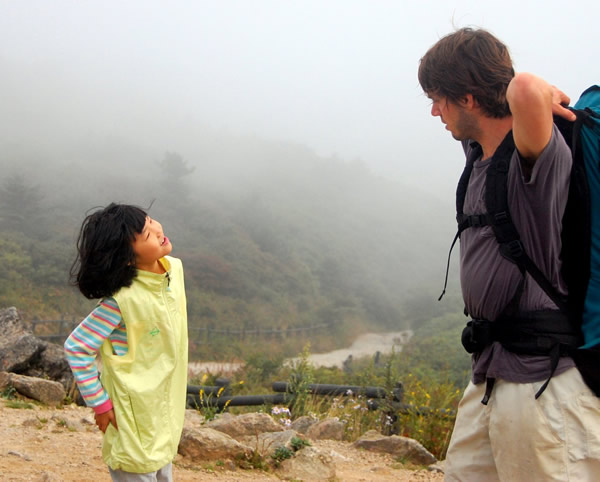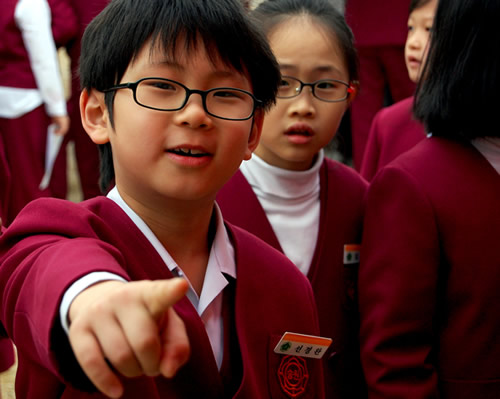Living in Korea: Hollywood and Xenophobia
Article and photo by Lindsay Nash

Moving to Korea is the closest I have ever gotten to Hollywood.
I live in Gwangju, a city located in the southern part of the country. While it is much smaller and less international than Seoul, it is the sixth largest city in Korea and boasts a population of 1.5 million. Every public school here—and thousands of private English academies, known as hogwans—employ at least one foreigner. So even in my city, a large community of expatriates exists.
While I am considered “special” by my students and just about anyone I see on the sidewalks, I am one of many native English speakers who have moved to Korea to teach English. While there are some 20,000 of us here, it has still not been enough to make a dent in this country of 50 million once known as the “Hermit Kingdom.”
So what is it like, living day in and day out in a country some deem a little too xenophobic?
Some days it’s like living in Hollywood. You are given free food. The best seat on the bus is yours. Shouts of “Hello!!!!” greet you from every street corner. If a camera crew is around, you will ALWAYS be featured on the 5:00 news. And if you’re lucky, you will be asked by a plucky parent to be in a family photo on their trip to the beach, the mountain, the line at the grocery store, the fill-in-the-blank.
On the not-so-glamorous days, it’s a bit like living in a zoo. You’re the monkey in a cage and they’re just standing outside staring in, pointing, laughing, and occasionally throwing you a banana.
It is a rare day when I can walk more than a few street blocks without a small child lifting his accusatory finger to my face and screaming, “O-ma!!! Migukan!!!” Mom! An American! (Children often assume any white person is American. I can’t begin to tell you what a great impression Barack Obama has left on this country and their now-changing image of what is America. That’s a whole different story just begging to be written.)

Once, in our city bus station, a very old man shuffled slowly up to my husband who was wearing a short-sleeved shirt in the middle of the summer. The man said nothing, just stared, and slowly brought his hand up to rub my husband’s arm up and down, feeling the strange hair on his arms.
My husband and I are the only foreigners in our elementary school. But our English department includes nine other Korean women and a non-English-speaking female vice-principal who insisted on giving us a house warming when we first moved into our comfortable apartment.
“She wants to look in your refrigerator,” one of our Korean co-teachers translated. “And now your freezer.”
This might scare you, the idea that you are likely to be the center of attention just about everywhere you go. I know it certainly shocked me at first. As an avid runner, I had a really hard time adjusting to running what felt like a race where I was the only runner. Men high-fived me as I ran my way up hills. Children shouted at me from behind. Women stared at me like I was crazy.
As a person who sometimes just wants to be in my world, it was a hard adjustment.
But moving to a strange country on the other side of the world isn’t supposed to be easy or comfortable. Or everyone would do it. Living abroad takes gumption, guts and a really good sense of humor.
Koreans are quick to stare silently in wonder at—or possibly in fear of—you. But that’s just another sign that you are living in territory less trodden. Korea does not get the tourists that their more popular neighbors China and Japan attract. It’s often skipped over completely on Asian tours. And people who do visit the country rarely get out of Seoul—which is a shame.
This is an amazingly beautiful country with amazingly kind people. They might seem standoffish at first. But that man who bores a hole in your head one day just might be the man who fixes your air conditioner the next. That woman who covered her mouth and giggled at the first glance of you just might be the woman who helps you figure out where to get off the bus, even jumping off with you to make sure you arrive at your next direction. And that child who pointed at you and pretended to fall out of his desk on the first day of school will definitely be the child who runs and hugs you after a winter vacation.
So if you’re thinking about coming to Korea and are worried about living in a fishbowl, just remember, being a movie star for a day has its advantages. And one day you’ll go back home and be just a little bit disappointed that you’re not such a big deal anymore.
More Information on Living in Korea
Learn more about their culture. You respect them, and they’ll definitely respect you. Follow some of these simple cultural rules:
-
When visiting temples, homes, restaurants or guest houses, always remove your shoes at the door. Wearing socks or stockings is more polite than bare feet.
-
Dress conservatively. Casual clothing is fine in most situations. In hot months, men rarely wear shorts.
-
When visiting someone’s home, bring along a small gift. Fresh fruit or boxed Spam (really!) or tuna sets are always appreciated.
-
When paying, always use your right hand, with your left hand placed politely on the inside of your right elbow.
-
When receiving a gift or business card, always accept with two hands.
Interested in learning more about teaching or living in Korea?
English Program in Korea (EPIK) is a Government program that places teachers in public schools in Korea. A trusted source for job placement in Korea's public schools.
Templestay. Want to do a temple stay? Visit this site to read about Korea's participating temples, including those that offer English translation. An overnight stay at a centuries old temple offers a true glimpse into Korean Buddhism.
Lonely Planet Korea is the essential guidebook for Korea, is a must if you are planning on traveling or living in Korea. It offers the details you need, from the best hotels and restaurants to off-the-beaten-path must-sees.
|
Lindsay Nash is an American living and teaching in Gwangju, South Korea. She is a former newspaper reporter who now spends her time teaching English to elementary school children and doing freelance photography and writing.
|
